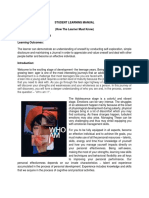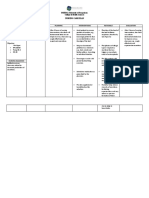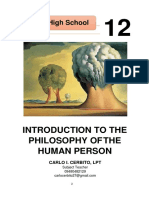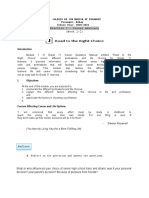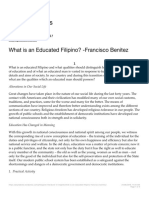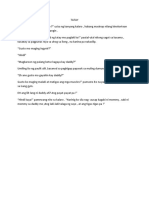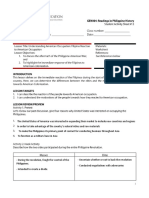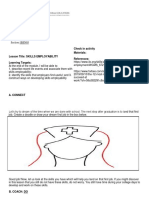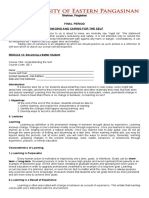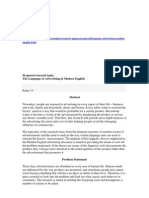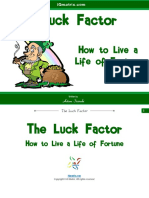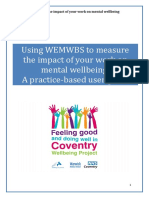Professional Documents
Culture Documents
Sas1 Gen 002
Sas1 Gen 002
Uploaded by
Luna ValeriaOriginal Description:
Original Title
Copyright
Available Formats
Share this document
Did you find this document useful?
Is this content inappropriate?
Report this DocumentCopyright:
Available Formats
Sas1 Gen 002
Sas1 Gen 002
Uploaded by
Luna ValeriaCopyright:
Available Formats
GEN 002: Understanding The Self
Module #1 Student Activity Sheet
Lesson title: From the Perspective of Philosophy Materials:
White Board Marker, White Board,
Lesson Objectives: At the end of the lesson, TV/Projector, Internet Connection
students will:
1. Learn different views of Philosophers Reference/s :
and http://www.sparknotes.com/philosophy/a
2. Apply their learning into their everyday ugustine/section1.rhtml
life. https://www.tes.com/lessons/CMfHIsTp2
XFD6w/compare-and-contrast
A. LESSON PREVIEW
Introduction (2 mins)
Good day my dear students. How are you? Are you feeling alright? Make yourself comfortable so
that learning will sink in.
Have you heard the name Aristotle, Socrates or Plato?
What do you remember about them?
Do you still remember some Philosophers views, kindly share it in the class.
What do you think, why we need to study different Philosopher?
kindly give other philosopher aside from name I already gave.
In this module, we will learn about what are the different philosophies of different Philosophers.
And make it as a guide in life.
This document is the property of PHINMA EDUCATION
1
GEN 002: Understanding The Self
Module #1 Student Activity Sheet
B. MAIN LESSON
Content Notes (13 mins)
You can make use of a highlighter to highlight important details in the text. This will
help you study effectively.
For Socrates, the goal of philosophy was to "Know thyself". Knowing others is wisdom. Knowing
the self is enlightenment. Mastering others requires force. Mastering the self requires strength.
"Self-knowledge alone eradicates misery". Self-knowledge alone is the means to the highest
bliss." "Absolute perfection is the consummation of Self-knowledge." Knowledge of oneself can
be achieved only through the Socratic Method, that is to say, the dialogue between the soul and
itself, or between a student and his teacher.
Socrates is as often in the role of questioner, as an attendant emotional. Socrates’ questions
because he knows nothing, knows he knows nothing, has nothing to learn, but it can help its
followers to discover the truths they have in them. Without this work on yourself, life is
worthless according to Socrates.
Plato is a dualist; there is both immaterial mind (soul) and material body, and it is the soul that
knows the forms. Plato believed the soul exists before birth and after death. Thus he believed
that the soul or mind attains knowledge of the forms, as opposed to the senses. Needless to say,
we should care about our soul rather than our body. The soul (mind) itself is divided into 3
parts: reason; appetite (physical urges); and will (emotion, passion, spirit.) The will is the source
of love, anger, indignation, ambition, aggression, etc. When these aspects are not in harmony,
we experience mental conflict. The will can be on the side of either reason or the appetites. We
might be pulled by lustful appetite, or the rational desire to find a good partner. To explain the
interaction of these 3 parts of the self, Plato uses the image is of the charioteer (reason) who
tries to control horses representing will and appetites. Elsewhere he says that reason uses the
will to control the appetites.
Aristotle defined the soul as the core essence of a living being, but argued against its having a
separate existence. For instance, if a knife had a soul, the act of cutting would be that soul,
because 'cutting' is the essence of what it is to be a knife. Unlike Plato and the religious
traditions, Aristotle did not consider the soul as some kind of separate, ghostly occupant of the
This document is the property of PHINMA EDUCATION
2
GEN 002: Understanding The Self
Module #1 Student Activity Sheet
body (just as we cannot separate the activity of cutting from the knife). As the soul, in Aristotle's
view, is an activity of the body, it cannot be immortal (when a knife is destroyed, the cutting
stops). More precisely, the soul is the "first activity" of a living body. This is a state, or a potential
for actual, or 'second', activity. "The axe has an edge for cutting" was, for Aristotle, analogous to
"humans have bodies for rational activity," and the potential for rational activity thus constituted
the essence of a human soul. Aristotle used his concept of the soul in many of his works; the De
Anima (On the Soul) provides a good place to start to gain more understanding of his views.
St. Augustine in his Confessions takes this idea and expands it into an entire genre that critically
inquires what it means to be a person. This identity is achieved through a two-fold process: self-
presentation, which leads to self-realization. Only in the presence of the Omnipotent and the
Omniscient can the self attain happiness and completeness.
Descartes thought that the self is a thinking thing distinct from the body. His first famous
principle was” Cogito, ergo sum", which means “I think, therefore I am." Although the mind and
body are physically together as a whole, the mind and body are mentally independent and serve
their own function.
Check for Understanding (5 mins)
You are doing well! Next, you need to answer the activity below. This will assess your learning
about the lesson.
Cogito, ergo sum 1. Famous principles of Descartes.
The essence of being living 2. Plato defines soul as
Knowing thyself 3. Goal of philosophy by Socrates was
Socrates 4. Self and Body is inseparable.
Plato 5. believed the soul exists before birth and after death.
This document is the property of PHINMA EDUCATION
3
GEN 002: Understanding The Self
Module #1 Student Activity Sheet
C. LESSON WRAP-UP
Frequently Asked Questions
Since we know you have questions about this lesson, we write 3 items and answer it on your
behalf so it will be clear to you. Please read the following questions and the corresponding answers to
it.
1. Which of the Philosophers influences you much? How?
You may choose from the philosophies that sought you best. it’s your personal opinion
and choose, based on your line of thinking, behavior and interpersonal relationship.
2. Can I make my own philosophy?
Yes, why not? For as long as the philosophy that you make leads your life to a progressive,
constructive, effective life in the future and that would contaminate others life as well.
3. Can I pattern my philosophy in life to other people’s philosophy?
Certainly! Philosophy are made to be a guiding light to our life path
Thinking about Learning (5 mins)
A). Learning Tracker
As part of the learning tracker, we prepared some questions to reflect on, please carefully read
the question below and give your honest answer.
What felt confusing about what you learned today?
I can see everything clearly thus far. How they define and express themselves in so many
different ways astound me greatly.
Did you have challenges in today’s learning? How did you overcome those challenges?
This document is the property of PHINMA EDUCATION
4
GEN 002: Understanding The Self
Module #1 Student Activity Sheet
I haven't encountered any difficulties in my studies so far.
Job well done; you have reached the end of this module! We are looking forward to more meaningful
learning with you.
KEY TO CORRECTIONS
Check your Understanding
1. Cogito, ergo sum
2. as the essence of living being.
3. Know thy self
4. Socrates
5. Plato
This document is the property of PHINMA EDUCATION
5
GEN 002: Understanding The Self
Module #1 Student Activity Sheet
This document is the property of PHINMA EDUCATION
6
GEN 002: Understanding The Self
Module #1 Student Activity Sheet
This document is the property of PHINMA EDUCATION
1
GEN 002: Understanding The Self
Module #2 Student Activity Sheet
Lesson title: Materials:
Self from the Perspective of Student Activity Sheet
Sociology
References:
Lesson Objectives: At the end of the https://www.iep.utm.edu/mead/
lesson, students will be able to: http://philschatz.com/sociology-book/contents/m42821.
1. Understand our self according html
to Sociological perspective; and Gazzingan,L., et.al. (2018), Understanding the Self,
2. Give importance to things that Panday. lahi Publishing
help us grow and develop.
A. LESSON PREVIEW
Introduction (2 mins)
A pleasant day to everyone! How are you? Hope you’re doing well with your studies! Did you
read something about our new lesson?
When we talk about Sociology, what comes to your mind?
Do you know some famous sociologist? What do they teach us?
Does our environment has something to do with ourselves? How does it affects
us?
Today’s lesson is all about Sociologist and their contributions, together with effect of sociology to
the pond of knowledge.
B. MAIN LESSON
Content Notes (13 mins)
This document is the property of PHINMA EDUCATION
1
GEN 002: Understanding The Self
Module #2 Student Activity Sheet
You can make use of a highlighter to highlight important details in the text. This will
help you study effectively.
Sociological Perspective on Self
Classical sociological perspective, the Self is a relatively stable set of perceptions of who we are
in relation to ourselves, others, and to social systems. The self is socially constructed in the
sense that it is shaped through interaction with other people.
Charles Cooley’s theory of the “looking glass self.”
Cooley wrote that people’s ideas of themselves have “three principal elements:
(1) the imagination of our appearance to the other person;
(2) the imagination of his judgment of that appearance, and
(3) some sort of self-feeling, such as pride or mortification
The thing that moves us to pride or shame is…the imagined effect of this reflection upon
another’s mind…. We are ashamed to seem evasive in the presence of a straightforward man,
cowardly in the presence of a brave one, gross in the eyes of a refined one, and so on. We
always imagine, and, in imagining, share the judgments of the other mind. A man will boast to
one person of an action—say some sharp transaction in trade—which he would be ashamed to
own to another.” To put it more simply, the way you imagine other people perceiving you affects
the way you feel about yourself, which in turn affects your attitude and even your appearance.
And you may change the way you present yourself depending on who you’re trying to impress or
fit in with. I realized that the looking glass self applies to my own life right at that moment. This
drawing depicts the looking-glass self. The person at the front of the image is looking into four
mirrors, each of which reflects someone else's image of him back to him.
Mead's theory of the social self is based on the perspective that the self emerges from social
interactions, such as observing and interacting with others, responding to others' opinions about
oneself, and internalizing external opinions and internal feelings about oneself.
Three activities develop the self:
This document is the property of PHINMA EDUCATION
2
GEN 002: Understanding The Self
Module #2 Student Activity Sheet
1.Language develops self by allowing individuals to respond to each other through symbols,
gestures, words, and sounds. Language conveys others' attitudes and opinions toward a subject
or the person. Emotions, such as anger, happiness, and confusion, are conveyed through
language.
2. Play develops self by allowing individuals to take on different roles, pretend, and express
expectation of others. Play develops one's self-consciousness through role-playing. During role-
play, a person is able to internalize the perspective of others and develop an understanding of
how others feel about themselves and others in a variety of social situations.
3. Games develop self by allowing individuals to understand and adhere to the rules of the
activity. Self is developed by understanding that there are rules in which one must abide by in
order to win the game or be successful at an activity.
Mead develops William James' distinction between the "I" and the "me." The "me" is the
accumulated understanding of "the generalized other" i.e. how one thinks one's group perceives
oneself etc. The "I" is the individual's impulses. The "I" is self as subject; the "me" is self as object.
The "I" is the knower; the "me" is the known. For Mead the thinking process is the internalized
dialogue between the "I" and the "me."
The "I" is the response of an individual to the attitudes of others, while the "me" is the organized
set of attitudes of others which an individual assumes.
The Looking Glass Self; Who Holds Our Reflections?
An interesting discussion is about the theory of the Looking Glass Self by Charles Horton Cooley.
Cooley thought that an individual and society do not exist separately, but rather the individual is
the product society and society is the product of the individual. There are three parts to the
concept; how a person thinks the other(s) perceives him, how the person thinks the other(s)
judges that perception, and the reaction of the person to the assumed perceptions and
judgments.
I can imagine what a group of diverse people sitting around discussing this may argue, both for
and against the theory. What a lively debate it could be, mixing young and old, liberal and
conservative, and experienced and inexperienced into the same group. Ah, how many of those
This document is the property of PHINMA EDUCATION
3
GEN 002: Understanding The Self
Module #2 Student Activity Sheet
individuals, I wonder, would have dressed to convey an image to the others, would speak in
certain manners in order to impress or distress, or would consider what the importance of their
statements would have upon the other group members?
At first, the theory seems to explain that each person is no more than a reflection of society.
More realistically, the theory means we are products of our cultures, our physical surroundings,
and the human beings with whom we associate. Generally, I think it can be agreed, most people
want to fit into society in some manner. And to fit in means to obey some of the rules of the
group to which we belong, or want to belong.
Considering everyone wants to fit in somewhere, people we surround ourselves with have a
great influence on who we become. The type of people that we associate with differs through
the various stages of our lives; the drinking buddies we may have had in our early twenties may
not be the same people we want as godparents for our children. The people from Church are
probably not the people we would invite to a bachelor party.
And so, as we grow older, what type of people should we associate with? What reflections of
ourselves do we want to nurture? It depends on how each of us view the process of aging, what
and when is "old age" to each of us, do we plan to "go gently into the night" or will we remain
active in and throughout the middle and latter stages of life, just as we did in our physical youth?
There are no wrong answers, merely different ways for different people. Simply being aware of
the influences others have on us is important. In that way, we can more actively choose those
from whom we are reflected, and be mindful of how we react to others, as reflections of who
they are.
This document is the property of PHINMA EDUCATION
4
GEN 002: Understanding The Self
Module #2 Student Activity Sheet
Check for Understanding (5 mins)
You are doing well! Next, you need to answer the activity below. This will assess your learning
about the lesson.
Let’s try your memory, I will give you enumeration type of short assessment to determine
your comprehension.
Now it’s time for you to answer ….
1 – 2 What are the two distinctions of self?
1. Me
2. I
3 – 5 Activities develop the self
3. Play
4. Language
5. Game
6 – 8 Charles Cooley Theory Looking Glass Self, 3 principal elements
6. Some sort of self-feeling, such as pride or mortification.
7. The imagination of our appearance to the other person.
8. The imagination of his judgement of the appearance.
This document is the property of PHINMA EDUCATION
5
GEN 002: Understanding The Self
Module #2 Student Activity Sheet
C. LESSON WRAP-UP
Frequently Asked Questions
Since we know you have questions about this lesson, we write 3 items and answer it on your
behalf so it will be clear to you. Please read the following questions and the corresponding answers to
it.
1. Do parents need to be careful in their words, gestures, languages and attitudes because it
might be imitated by children observing them. why?
Ans. Certainly Yes! Anything seen / observe by children from their parents and adults are
presume right and correct.
2. Is it right for parents to be over protective to their children?
Ans. Yes, in a way that protecting them from harm, but not if the knowledge development
and exploration are controlled.
3. Is it necessary for us to reflect?
Ans. Yes, so that we can evaluate our progress, and our behavior if appropriate or not.
Thinking about Learning (5 mins)
A). Learning Tracker
As part of the learning tracker, we prepared some questions to reflect on, please carefully read
the question below and give your honest answer.
What felt confusing about what you learned today?
None so far
Did you have challenges in today’s learning? How did you overcome those challenges?
I'm happy to share that this lesson has taught me a lot. Thankfully, I don't encounter any
difficulties from this lecture.
This document is the property of PHINMA EDUCATION
6
GEN 002: Understanding The Self
Module #2 Student Activity Sheet
Job well done; you have reached the end of this module! We are looking forward to more meaningful
learning with you.
KEY TO CORRECTIONS
Check your Understanding
1. I
2. Me
3. Language
4. Play
5. Games
6. the imagination of our appearance to the other person
7. the imagination of his judgment of that appearance,
8. some sort of self-feeling, such as pride or mortification
This document is the property of PHINMA EDUCATION
7
GEN 002: Understanding The Self
Module #2 Student Activity Sheet
This document is the property of PHINMA EDUCATION
8
GEN 002: Understanding The Self
Module #3 Student Activity Sheet
Lesson title: Materials:
Self: From the Perspective of Student Activity Sheet
Anthropology
References:
Lesson Objectives: At the end https://sites.google.com/site/theorymaphelene/clifford-geertz/
of the lesson, students will be impact-of-the-concept-of-culture-on-the-concept-of-man
able to: https://www.huffingtonpost.com/margaret-paul-phd/loving-
1. Know how Culture connection_b_2559654.html
shapes ourselves https://nadinedib.wordpress.com/2013/02/28/does-culture-shape-our-
2. Appreciate ourselves in personal-identity/comment-page-1/
Anthropological
perspective
A. LESSON PREVIEW
Introduction (2 mins)
Good day, students! It’s nice to be with you again for another inspiring topic that will trigger / exercise
your mind to think. (Thinking is growing, and growing is development.)
What is Anthropology?
Do Anthropology and Sociology the same? What do they differ from each other?
What is in Anthropology that creates our identity?
Today’s lesson is all about Anthropology,
B. MAIN LESSON
Content Notes (13 mins)
You can make use of a highlighter to highlight important details in the text. This will
help you study effectively.
This document is the property of PHINMA EDUCATION
1
GEN 002: Understanding The Self
Module #3 Student Activity Sheet
Anthropology is the scientific study of the origins of humans, how we have changed
over the years, and how we relate to each other, both within our own culture and with
people from other cultures.
Anthropology is the study of what makes us human. Anthropologists take a broad approach
to understanding the many different aspects of the human experience, which we call holism.
They consider the past, through archaeology, to see how human groups lived hundreds or
thousands of years ago and what was important to them.
Anthropologists study the concept of culture and its relationship to human life in different
times and places. They study other societies to gain a clearer perspective on our own.
They study the past to help interpret the present. Students who major in anthropology are
curious about other cultures and other times.
Such study allows us to better understand why people behave the way they do and how
different groups have such amazing variety in their lifeways. It allows us to learn about diversity
and respect the adaptability of man to the enormous variety of environments where people live.
In studying and interpreting the vast range of similarities and differences in human societies
and cultures, anthropologists also seek to understand how people themselves make sense of
the world in which they live. A concentration in Anthropology provides students with a broad
introduction to the discipline.
Anthropologists have most frequently employed the term 'identity' (self) to refer to this idea of selfhood
in a loosely Eriksonian way (Erikson 1972) properties based on the uniqueness and individuality which
makes a person distinct from others. Identity (self) refers to qualities of sameness in relation to a
person's connection to others and to a particular group of people.
When we are disconnected from ourselves — from who we really are and from our feelings — and when
we are not filling ourselves with love through our spiritual connection, we create a black hole within. The
black hole we’ve created through our self-abandonment becomes like a vacuum, trying to pull love from
others.
This document is the property of PHINMA EDUCATION
2
GEN 002: Understanding The Self
Module #3 Student Activity Sheet
Cultural anthropology brings us into contact with different ways of life and
challenges our awareness of just how arbitrary our own understanding of the world is as we
learn how other people have developed satisfying but different ways of living.
The Self embedded in Culture
Theorists of culture and personality school argued that socialization creates personality patterns.
It shapes a person’s emotions, thoughts, behaviors, cultural values and norms to fit into and function as
productive members in the surrounding human society. The study of culture and personality wanted to
examine how different socialization practices resulted in different personality types.
Impact of the Concept of Culture on the Concept of Man
Basic Premises
1. (marriage, economy, religion, etc.)
2. what makes people/cultures different, not the same;
3. Culture is the "accumulated totality" of symbolic patterns that appear in different societies
4. what man is capable of and how he actually behaves, which in turn helps define human nature
Check for Understanding (5 mins)
You are doing well! Next, you need to answer the activity below. This will assess your learning
about the lesson.
Write T if the answer is TRUE and F if its FALSE.
T 1. Fiesta, music, dresses, hair style and dance are part of anthropology.
T 2. Harana is singing of song to a girl whom your courting.
F 3. Bayanihan is part of Indonesian culture
T 4. Based on Anthropology study in the Philippines, Christianity came from Spaniard who
conquer us.
F 5. Majority of our language came from Chinese words
T 6. Cultural anthropology brings us into contact with different ways of life and
challenges our awareness of just how arbitrary our own understanding of the world is as we
learn how other people have developed satisfying but different ways of living
F 7. Sociology is the study the past to help interpret the present.
This document is the property of PHINMA EDUCATION
3
GEN 002: Understanding The Self
Module #3 Student Activity Sheet
F 8. Anthropology is the scientific study of the origins of animals, how they have changed
over the years.
T 9. Marriage, Economy, Religion, etc are part of Anthropology
T 10. Anthropology shapes a person’s emotions, thoughts, behaviors, cultural values and norms
to fit into and function as productive members in the surrounding human society.
C. LESSON WRAP-UP
Frequently Asked Questions
Since we know you have questions about this lesson, we write 3 items and answer it on your
behalf so it will be clear to you. Please read the following questions and the corresponding answers to
it.
1. Do all the things that happen to our life defines what kind and status and identity you have in
the society?
Ans. Yes! Because anything that we accomplish, attain in life tells the community where you live
what kind of person are you? And where do you belong. That’s why background investigation is
always done and as bases for assessment.
2. How is SELF shaped and influenced by culture?
Ans. Our parents and the environment handed it down to us, teaching us the righteous way to
be accepted in the community where we live. And we do the same thing to the next generation.
3. Can Traditions and Culture change?
Ans. It only modifies but it doesn’t change completely nor remove.
This document is the property of PHINMA EDUCATION
4
GEN 002: Understanding The Self
Module #3 Student Activity Sheet
Thinking about Learning (5 mins)
A). Learning Tracker
As part of the learning tracker, we prepared some questions to reflect on, please carefully read
the question below and give your honest answer.
What felt confusing about what you learned today?
None so far
Did you have challenges in today’s learning? How did you overcome those challenges?
I’m so happy to say that I was able to grasp all the lessons.
Job well done; you have reached the end of this module! We are looking forward to more meaningful
learning with you.
KEY TO CORRECTIONS
Check your Understanding
1. T
2. T
3. F
4. T
5. F
6. T
7. F
This document is the property of PHINMA EDUCATION
5
GEN 002: Understanding The Self
Module #3 Student Activity Sheet
8. F
9. T
10.T
This document is the property of PHINMA EDUCATION
6
You might also like
- SAS04 MAT 152 - Polya Problem SolvingDocument8 pagesSAS04 MAT 152 - Polya Problem SolvingAkira Poscablo PiranteNo ratings yet
- The Fifth Initiation and The Process After ItDocument11 pagesThe Fifth Initiation and The Process After ItRamon MartinezNo ratings yet
- Three Keys To Positive Confession - PriceDocument95 pagesThree Keys To Positive Confession - PriceHerman Crump100% (1)
- Music As Simulacrum of Mental Life - S. Feder (2004)Document24 pagesMusic As Simulacrum of Mental Life - S. Feder (2004)vladvaideanNo ratings yet
- Gen 002 Lesson 4Document5 pagesGen 002 Lesson 4Faye SaludNo ratings yet
- NST 021 - Basic Life Saving 2 (Sas)Document9 pagesNST 021 - Basic Life Saving 2 (Sas)Lady Mae AguilarNo ratings yet
- Gen004 - Sas 21-25Document5 pagesGen004 - Sas 21-25ricmols9No ratings yet
- SAS#2 - NST 021 - NSTP Law - SASDocument6 pagesSAS#2 - NST 021 - NSTP Law - SASCed RickNo ratings yet
- Assignment EthicsDocument1 pageAssignment EthicsFidel Zapata0% (1)
- Week 4 Occ Learning Activity SheetDocument8 pagesWeek 4 Occ Learning Activity SheetAngelynne Bagaconza MirabelNo ratings yet
- Orca Share Media1675064485181 7025729670455348025Document55 pagesOrca Share Media1675064485181 7025729670455348025RedMoonLight100% (1)
- Example 1 The Sentiments of KundimanDocument6 pagesExample 1 The Sentiments of KundimanDYLANNo ratings yet
- Academic Writing SamplesDocument3 pagesAcademic Writing SamplesJem BicolNo ratings yet
- Chapter 1Document5 pagesChapter 1robert sabeloNo ratings yet
- English For Academic and Professional PurposesDocument10 pagesEnglish For Academic and Professional PurposesElaine Jhen TuringanNo ratings yet
- Health Optimizing Physical Education66666Document1 pageHealth Optimizing Physical Education66666Ericka Rivera Santos100% (1)
- Jallores, Claire Ann Pajarito Bsed English B2-04-COED1Document5 pagesJallores, Claire Ann Pajarito Bsed English B2-04-COED1Nena PajutaganaNo ratings yet
- Tncy Act 1.1 in or OutDocument1 pageTncy Act 1.1 in or OutGab GonzagaNo ratings yet
- Activity (Family Fitness at Home)Document2 pagesActivity (Family Fitness at Home)Yosh Mor33% (3)
- Person S Lively OR Reserve D? Nurturing OR Disciplinar Ian? Conserv Ative or Liberate D? Thinke ROR Doer? Planne RORDocument6 pagesPerson S Lively OR Reserve D? Nurturing OR Disciplinar Ian? Conserv Ative or Liberate D? Thinke ROR Doer? Planne ROREllaNo ratings yet
- Quarter 1 Module 2 Lesson 5Document5 pagesQuarter 1 Module 2 Lesson 5juvy abelleraNo ratings yet
- Concept Map Ethics Gned 02Document2 pagesConcept Map Ethics Gned 02JOHN JOMIL RAGASANo ratings yet
- Gen 003 Mod 15Document5 pagesGen 003 Mod 15jhonrievelascoNo ratings yet
- Session #17 SAS - AnaPhy (Lab)Document4 pagesSession #17 SAS - AnaPhy (Lab)Nicole Ken AgdanaNo ratings yet
- EDU050: Field Study 1 Student Activity Sheet #4: 1) (2 Mins)Document7 pagesEDU050: Field Study 1 Student Activity Sheet #4: 1) (2 Mins)Ann Maire Jamili100% (1)
- Sas# 1 - Art 002Document6 pagesSas# 1 - Art 002Mervin AliviadoNo ratings yet
- Copy The Question Before Providing Answers: GED102 - MMW ScoreDocument2 pagesCopy The Question Before Providing Answers: GED102 - MMW ScoreCarlAngeloSanosaJr.100% (2)
- Quiz (Structure)Document17 pagesQuiz (Structure)Erika PhoebeNo ratings yet
- Eapp Quarter 2 Module 8Document6 pagesEapp Quarter 2 Module 8Jasmine CorpuzNo ratings yet
- Republic of The Philippines Department of Education Region VII, Central Visayas Division of BoholDocument4 pagesRepublic of The Philippines Department of Education Region VII, Central Visayas Division of BoholCecille HernandoNo ratings yet
- What's New: Color The Fun GameDocument4 pagesWhat's New: Color The Fun GameJonrheym RemegiaNo ratings yet
- Part 6. Sample Learners Learning MaterialDocument17 pagesPart 6. Sample Learners Learning MaterialJonJon BrionesNo ratings yet
- PHINMA University of Pangasinan College of Health Sciences Nursing Care PlanDocument2 pagesPHINMA University of Pangasinan College of Health Sciences Nursing Care PlanJoeriel MontemayorNo ratings yet
- Las Philo Week 1Document6 pagesLas Philo Week 1Rheena-Ann Dupale PadillaNo ratings yet
- Philos 2.1Document24 pagesPhilos 2.1High School LifeNo ratings yet
- Peh 12 - Health and Fitness Related CareerDocument2 pagesPeh 12 - Health and Fitness Related CareerBenedict LumagueNo ratings yet
- Activity On Hazard Concept, Types, and ImpactsDocument3 pagesActivity On Hazard Concept, Types, and Impactsjulz sanchezNo ratings yet
- Eapp Quarter 2 Module 7Document6 pagesEapp Quarter 2 Module 7Jasmine CorpuzNo ratings yet
- Chapter 2 Compound Interest 1 2Document22 pagesChapter 2 Compound Interest 1 2Rodin PaspasanNo ratings yet
- Elective 1-Career Advocacy (w1-2)Document7 pagesElective 1-Career Advocacy (w1-2)mariel balaguerNo ratings yet
- Sept 4 Lesson 1 The Nature of MathematicsDocument11 pagesSept 4 Lesson 1 The Nature of MathematicsLala LalaNo ratings yet
- What Is An Educated Filipino - Francisco Benitez Blog Ni Sir LabsDocument4 pagesWhat Is An Educated Filipino - Francisco Benitez Blog Ni Sir LabsLuhr 06No ratings yet
- PRACTICAL RESEARCH 1 - Answer SheetDocument11 pagesPRACTICAL RESEARCH 1 - Answer SheetIlonah Jean Benito VivencioNo ratings yet
- 1Document6 pages1Kyle AlasaNo ratings yet
- Physical Education 12 Dance: Name: Jenalyn Bugaay Grade 12 - Abm ADocument8 pagesPhysical Education 12 Dance: Name: Jenalyn Bugaay Grade 12 - Abm AJenalyn BugaayNo ratings yet
- Sas 13 Gen 004 Nicole LigutanDocument8 pagesSas 13 Gen 004 Nicole LigutanNicole Victorino LigutanNo ratings yet
- Growth Mindset + Study Skills SAS 2nd SemDocument6 pagesGrowth Mindset + Study Skills SAS 2nd SemAlyssaNo ratings yet
- Fitness Goal PlanDocument3 pagesFitness Goal PlanGlaiza Jinayon100% (1)
- Trisha Mae Acruz - SESSION#11 (SAS TRAITS AND SKILLS)Document10 pagesTrisha Mae Acruz - SESSION#11 (SAS TRAITS AND SKILLS)Trisha Mae AcruzNo ratings yet
- Francisco, Ma. Theresa Q. 1bsn-Ui (Session 16-Lab)Document2 pagesFrancisco, Ma. Theresa Q. 1bsn-Ui (Session 16-Lab)DANICA JEAN PRIANESNo ratings yet
- UTSDocument2 pagesUTSDonita BinayNo ratings yet
- Performance Task #1Document3 pagesPerformance Task #1Jan BrettNo ratings yet
- Uts Module 12Document6 pagesUts Module 12Cristobal CantorNo ratings yet
- Research Paper 2k202Document28 pagesResearch Paper 2k202Cloud CentimoNo ratings yet
- Page 3 2nd Semester His. 007 P2 EXAM PDFDocument8 pagesPage 3 2nd Semester His. 007 P2 EXAM PDFNorjiee MacasimbarNo ratings yet
- Common Logical Fallacies: English 1013 Purposive CommunicationDocument26 pagesCommon Logical Fallacies: English 1013 Purposive CommunicationRobert RodriguezNo ratings yet
- New Sinai School and Colleges: Problem and Its BackgroundDocument42 pagesNew Sinai School and Colleges: Problem and Its Backgroundaki franciaNo ratings yet
- ArticleDocument5 pagesArticleKhrissyl Ann SolidoNo ratings yet
- Q2 - (LAS) EAPP WK 4 PDFDocument9 pagesQ2 - (LAS) EAPP WK 4 PDFJazer LeuterioNo ratings yet
- Technical Writing Technique No. 1Document31 pagesTechnical Writing Technique No. 1Marlyn GarciaNo ratings yet
- Sas1 Gen 002Document7 pagesSas1 Gen 002Lyssa LimNo ratings yet
- Instructional Material: Biñan CampusDocument159 pagesInstructional Material: Biñan CampusMaria YukiNo ratings yet
- Sas4 Gen 002Document4 pagesSas4 Gen 002KJ GNo ratings yet
- Chief AimsDocument2 pagesChief AimsAndrea ValenciaNo ratings yet
- Munn - Gawan KulaDocument32 pagesMunn - Gawan KulaataripNo ratings yet
- The Language of Advertising in Modern EnglishDocument3 pagesThe Language of Advertising in Modern EnglishZaniel Zayer HakariNo ratings yet
- Cleanse To Live (E-Book Version) FinalDocument81 pagesCleanse To Live (E-Book Version) FinalElder Nava'Yah Yisrael100% (2)
- Re SerchDocument22 pagesRe SerchsileNo ratings yet
- American Mania When More Is Not Enough (Whybrow, Peter C)Document357 pagesAmerican Mania When More Is Not Enough (Whybrow, Peter C)Alukeny AlbertoNo ratings yet
- Modelling The Components of The BrandDocument17 pagesModelling The Components of The BrandSuban ManeemoolNo ratings yet
- 1910 Clymer Grand GrimoireDocument196 pages1910 Clymer Grand Grimoirejuanaiguana201492% (12)
- Red Star Over The Black Sea Nazim Hikmet and His Generation James H Meyer Download 2024 Full ChapterDocument23 pagesRed Star Over The Black Sea Nazim Hikmet and His Generation James H Meyer Download 2024 Full Chapterrichard.byrd946100% (13)
- Conscience - Its Nature & Function - 1895Document16 pagesConscience - Its Nature & Function - 1895Atreyu SiddharthaNo ratings yet
- Cognitive PsychologyDocument2 pagesCognitive Psychologyveerabalaji100% (2)
- Early Childhood Education: Locke and RousseauDocument55 pagesEarly Childhood Education: Locke and RousseauAlharamains PmecNo ratings yet
- The Luck Factor Ebook v3Document28 pagesThe Luck Factor Ebook v3BasuraNo ratings yet
- FU The Freeform Universal RPG (Classic Rules)Document24 pagesFU The Freeform Universal RPG (Classic Rules)Dr AbjakNo ratings yet
- Compassionate Leadership Paul Axtell Full ChapterDocument51 pagesCompassionate Leadership Paul Axtell Full Chapterpatrick.fern936100% (11)
- Identity Unit Plan 5th and 6thDocument3 pagesIdentity Unit Plan 5th and 6thapi-292318834No ratings yet
- The Final Philosophy 1000112837Document628 pagesThe Final Philosophy 1000112837Abdul Sami Abdul Latif100% (1)
- Study Guide Locke Berkeley Kant HumeDocument4 pagesStudy Guide Locke Berkeley Kant HumeEarl DatanNo ratings yet
- Psyhéarchitecture: A New Architectural ParadigmDocument11 pagesPsyhéarchitecture: A New Architectural ParadigmCodrutza IanaNo ratings yet
- Cognitive, Affective and Conative Domains of Sustainable ConsumptionDocument2 pagesCognitive, Affective and Conative Domains of Sustainable ConsumptionJadrien Mark ImperialNo ratings yet
- The Multiple Self in The Poetry ofDocument15 pagesThe Multiple Self in The Poetry ofPragati ShuklaNo ratings yet
- Chapter Review Ungs 1301 - Nu'man Azham - 2120255Document11 pagesChapter Review Ungs 1301 - Nu'man Azham - 2120255Nu'man AzhamNo ratings yet
- Using WEMWBS To Measure The Impact of Your Work On Mental Wellbeing: A Practice-Based User GuideDocument19 pagesUsing WEMWBS To Measure The Impact of Your Work On Mental Wellbeing: A Practice-Based User GuideMalkOo AnjumNo ratings yet
- Chakra Healing Workbook Meditations - DesiRae Kraft LLCDocument29 pagesChakra Healing Workbook Meditations - DesiRae Kraft LLCrashmivittalNo ratings yet
- Aesthetic Science - Connecting Minds, Brains, and ExperienceDocument26 pagesAesthetic Science - Connecting Minds, Brains, and Experiencediegomfagundes100% (1)
- Towards A General Theory of Touristic Experiences: Modelling Experience Process in TourismDocument8 pagesTowards A General Theory of Touristic Experiences: Modelling Experience Process in TourismALI BaghdadNo ratings yet
- 21 Habits of Happy People Spirit Science and Metaphysics PDFDocument5 pages21 Habits of Happy People Spirit Science and Metaphysics PDFlinteringNo ratings yet































